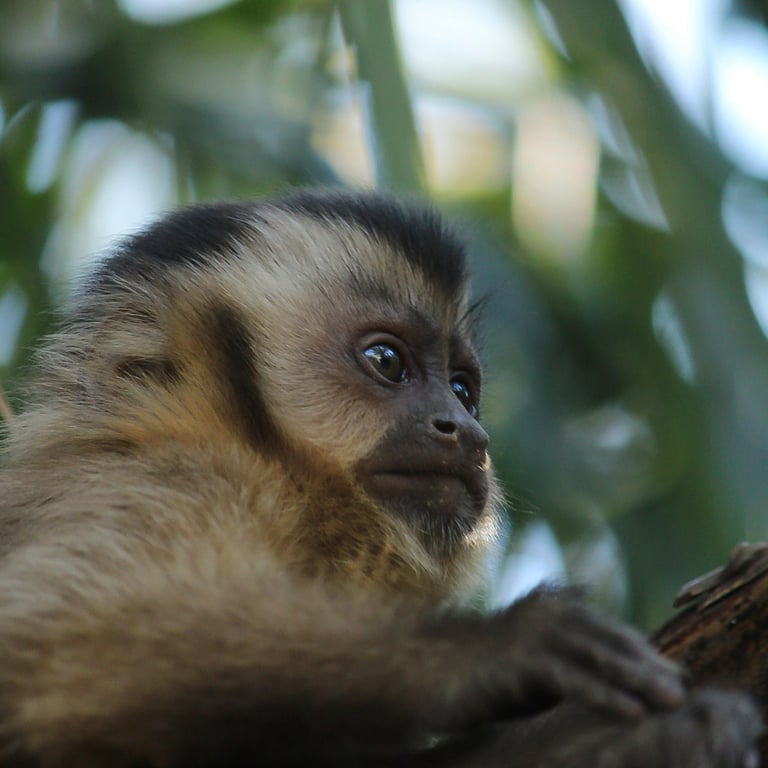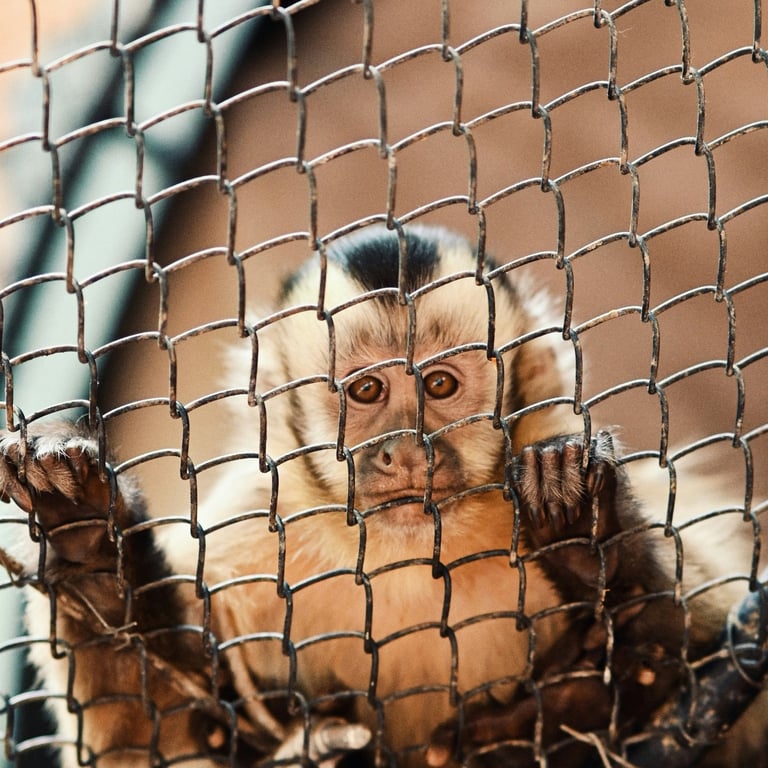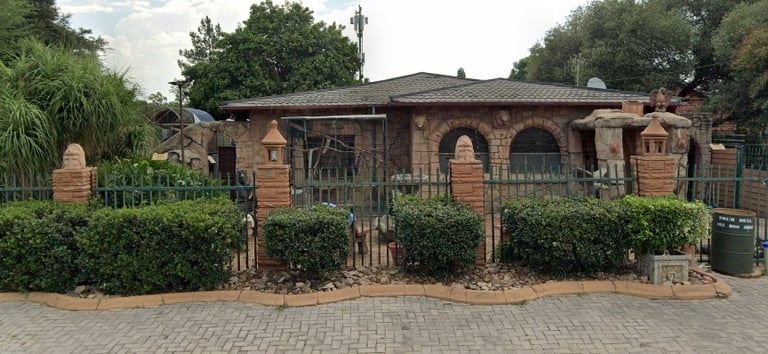Monkey Owners
Owning a monkey may seem like a dream come true — their expressive faces, playful energy, and human-like curiosity capture our hearts instantly. Yet, behind that adorable exterior lies a lifetime of commitment, responsibility, and often heartbreak. Monkeys, are not domesticated animals. They remain wild at heart, no matter how they are raised, and their natural instincts will always resurface as they mature.
During their juvenile years, they can appear affectionate and dependent, forming strong emotional bonds with their caregivers. But as they reach sexual maturity, their behavior changes drastically. The same monkey that once clung to you for comfort may become unpredictable, territorial, and even aggressive. These changes are not due to poor handling — they are a reflection of their natural instincts and complex social needs that cannot be fully met in a human home.
Proper nutrition is also essential and far more complex than many realize. A balanced diet should mimic what they would find in the wild — fresh fruits, vegetables, proteins, and enrichment-based feeding that stimulates natural foraging behavior. Inadequate diets often lead to serious health problems such as diabetes, bone deformities, and weakened immune systems.
Equally important is space and environment. Monkeys require both indoor and outdoor enclosures that are safe, secure, and designed to encourage climbing, problem-solving, and exploration. A bored or confined monkey quickly becomes frustrated, destructive, and depressed. Enrichment, social interaction, and stimulation are daily needs — not luxuries.
The decision to keep a monkey should never be made on impulse or emotion. It is a lifelong commitment that spans decades — often 30 to 40 years — filled with challenges most people never anticipate. Love alone is not enough; understanding, responsibility, and respect for their true nature must come first.
At CESH, we continue to educate and create awareness so that fewer monkeys end up in captivity, and more people choose to protect them where they truly belong — in the wild.
Bringing an exotic animal into your home is often a decision born from love and fascination. Their uniqueness, intelligence, and beauty captivate us — and it’s easy to believe that with enough care and attention, they can adapt to our world. But exotic pets, especially primates, wild cats, reptiles, and parrots, are not domesticated. They are governed by instincts that cannot be trained away, and those instincts often surface most strongly as they reach maturity.
When that happens, the reality can be painful. A once-gentle animal may suddenly bite, scratch, or act out aggressively, not out of malice but out of instinct and frustration. Many owners are then faced with a devastating truth — they can no longer keep their beloved pet safely. Compounding this heartbreak is the cost and space required to provide an appropriate life for an exotic animal. Proper enclosures, mates of the same species, specialized diets, and veterinary care can become overwhelming, both financially and emotionally.
In these moments, some turn to sanctuaries for help. It is important to understand that surrendering an exotic pet should always be a last resort. Sanctuaries are places of refuge, not convenience, and resources are often stretched thin caring for animals who can never return to the wild. When an animal is surrendered, the process typically includes signing a legal transfer of ownership. This means the former owner gives up all rights, claims, and authority over the animal from that day forward. The sanctuary then assumes full responsibility for the animal’s well being, including decisions about care, companionship, and whether visits will be allowed — or not.
In certain cases, sanctuaries may help re-home exotic pets to other approved and knowledgeable caregivers. However, this depends on many factors: the animal’s temperament, health, history, and the suitability of potential new homes. Each decision is made with the animal’s best interest at heart, not convenience or emotion.
The separation is often heartbreaking for both the owner and the animal. Bonds have been formed, memories made, and love deeply felt. Yet love also means recognizing when we cannot provide what they truly need. That is why education and foresight are so vital. Before bringing any exotic animal into your life, take the time to understand the lifelong commitment, costs, and consequences involved. Think carefully — because once that choice is made, it affects not only your life, but theirs forever.


At CESH, every day begins and ends with the sounds of nature — some gentle, some wild, but all filled with life. The sanctuary is home to a variety of animals, each with a story and personality of their own. Some roam more freely in designated areas, while others live in secure enclosures — decisions carefully made based on their temperament, maturity, health, and history. Every animal here is unique, and their care is as individual as they are.
Our trained caregivers work closely with the monkeys, learning their habits, moods, and requirements. Caring for exotic animals is never a one-size-fits-all task — it requires deep understanding and attention to detail. Each species has its own dietary needs, and every monkey’s health must be monitored closely. Some arrive with long-term medical conditions, such as diabetes, which require specialized care, medication, and often, late-night monitoring to ensure their safety and comfort.
Many of our residents arrive after being surrendered by their owners, often when the challenges of keeping a monkey become too overwhelming. These animals need more than just food and shelter — they need patience, compassion, and a chance to heal. Our team often works around the clock to feed, comfort, and watch over them, especially in the early days when they are confused or frightened by their new surroundings.
Even the simple joys of their daily lives come with hard work behind the scenes. When it rains, the monkeys delight in dragging their blankets out to play in the puddles. It’s heartwarming to see — but it also means hours of washing and drying to ensure every animal has a clean, dry blanket by nightfall, especially in winter. With so many monkeys in our care, large-capacity washing machines and tumble dryers are always in high demand.
Fresh fruit and vegetables are a daily staple, and maintaining enough supply — and storage — is an ongoing challenge. Recently, an industrial fruit and vegetable cutting machine was kindly donated to CESH, and it has made a big difference in saving time for our team. That time is now spent on other essential work — maintaining enclosures, rotating enrichment items, and ensuring that worn or unsafe materials are replaced promptly to keep the monkeys safe and stimulated.
Running a sanctuary like CESH takes enormous effort, dedication, and resources. It’s not easy — but it’s done with heart. Every cleaned blanket, every repaired cage, every meal prepared is an act of love and respect for the lives that depend on us.






Life at the Sanctuary
Behind the scenes and day-to-day at CESH
Do you consider to buy a Monkey - Read this first...
The life long commitment 35+ years monkey owners
When the dream becomes a nightmare...
Re-home or giving up your exotic pet, the heartache
CESH - Capuchin & Exotic Safe Heaven
Join us in caring for rescued monkeys today.
Awareness
potgieter_home@absamail.co.za
+27 (0) 82 496 3638
© 2025. All rights reserved.
CESH NPO 210-908
833 11th Ave, Wonderboom South, Pretoria, Gauteng, South Africa, 0084
Mobile number and WhatsApp:
ceshnpo@gmail.com
